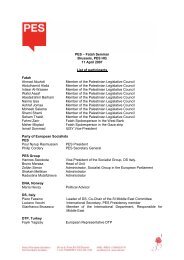Hedge funds and Private Equity - PES
Hedge funds and Private Equity - PES
Hedge funds and Private Equity - PES
You also want an ePaper? Increase the reach of your titles
YUMPU automatically turns print PDFs into web optimized ePapers that Google loves.
86<br />
Article 49<br />
Within the framework of the provisions set out below, restrictions on freedom to provide<br />
services within the Community shall be prohibited in respect of nationals of Member<br />
States who are established in a State of the Community other than that of the person for<br />
whom the services are intended.<br />
The Council may, acting by a qualified majority on a proposal from the Commission,<br />
extend the provisions of the Chapter to nationals of a third country who provide services<br />
<strong>and</strong> who are established within the Community.<br />
The principle of freedom of establishment enables an economic operator (whether a person or<br />
a company) to carry on an economic activity in a stable <strong>and</strong> continuous way in one or more<br />
Member States. The principle of the freedom to provide services enables an economic operator<br />
providing services in one Member State to offer services on a temporary basis in another<br />
Member State, without having to be established.<br />
The principles of freedom of establishment <strong>and</strong> free movement of services have been clarified<br />
<strong>and</strong> developed over the years through the case law of the European Court of Justice. In addition,<br />
important developments <strong>and</strong> progress in the field of services have been brought about<br />
through specific legislation in fields such as financial services, telecommunications, broadcasting,<br />
the recognition of professional qualifications <strong>and</strong> the services directive.<br />
These provisions have direct effect. This means, in practice, that Member States must modify<br />
national laws that restrict freedom of establishment, or the freedom to provide services, <strong>and</strong> are<br />
therefore incompatible with these principles. This includes not only discriminatory national rules,<br />
but also any national rules which are universally applicable to domestic <strong>and</strong> foreign operators<br />
but which hinder or render less attractive the exercise of these “fundamental freedoms”, in particular<br />
if they result in delays or additional costs. In these cases, Member States may only maintain<br />
such restrictions in specific circumstances where these are justified by overriding reasons of<br />
general interest, for instance on grounds of public policy, public security or public health; <strong>and</strong><br />
where they are proportionate.<br />
The Financial Services Action Plan 1999-2005 (FSAP) has laid the foundations of a financial<br />
market in the EU.<br />
3.2 The Treaty<br />
Free movement of capital, Articles 56-60 of EU Treaty<br />
The treaty articles on free movement of capital intend to create the basis for regulations, assuring<br />
integrated, open, transparent, competitive <strong>and</strong> efficient European financial markets <strong>and</strong> services.<br />
Article 56<br />
1. Within the framework of the provisions set out in this Chapter, all restrictions on the<br />
movement of capital between Member States <strong>and</strong> between Member States <strong>and</strong> third<br />
countries shall be prohibited.<br />
2. Within the framework of the provisions set out in this Chapter, all restrictions on<br />
payments between Member States <strong>and</strong> between Member States <strong>and</strong> third countries shall<br />
be prohibited.




